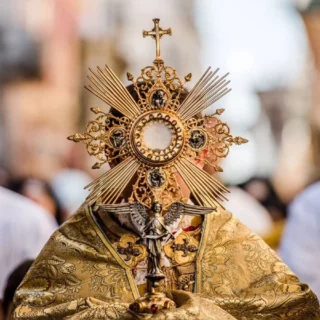

Credopedia
Fasting
Why is fasting such a big trend? What is special about Christian fasting? An up-to-date explanation based on the Bible and the Catechism.
Definition
Fasting is the partial or complete abstention from food, drink, stimulants and lifestyle habits for a certain period of time. One fast for health reasons or for the sake of a higher purpose. Fasting is a common practice in many religions. In Christianity, fasting is not an end in itself. However, it has a relative importance in that it helps people to recognise the primacy of God and to set out on the path again in a symbolic way — away from the ego and towards charity and God. In canon law, fasting appears as a means of penance, and it says: “All believers, each in his own way, are required by divine law to do penance.” For this purpose, general “penitential days are prescribed, on which the faithful devote themselves in a special way to prayer, perform works of piety and charity, deny themselves by fulfilling more faithfully the duties proper to them, and … especially fasting and abstinence (= abstaining from something).” YOUCAT 151 says: “But reading Sacred Scripture, prayer, fasting, and the performance of good works also have the effect of forgiving sins.”
What does the Holy Bible say?
The central biblical perspective is found in Joel 2,12: “Return to me with your whole heart, with fasting, weeping, and mourning.” To this it says in Is 58,6: “Is this not, rather, the fast that I choose: releasing those bound unjustly, untying the thongs of the yoke; Setting free the oppressed, breaking off every yoke?” Fasting is meant to lead to God and to make people better in their social behavior. That is why the disciples do not fast in the presence of Jesus as the other Jews do: “Can then the wedding guests mourn while the bridegroom is with them?” As a guideline in fasting, Jesus says, “When you fast, do not look gloomy like the hypocrites. They neglect their appearance, so that they may appear to others to be fasting.” (Mt 6,16)
A short YOUCAT-Catechesis
Fasting makes you fat
It seems like no one needs to be told to love fasting anymore. It breaks out every Spring. However, those who fast for purely physical reasons — the longing for the bikini figure, the washboard stomach — are not sufficiently enlightened, because after the phase of self-mortification, the starved cells take revenge and strike mercilessly. In other words, fasting makes you fat. It is better to eat normally, drink less alcohol and do a lot of exercise if physical improvement is your goal. However, fasting is sensible and highly efficient if you do it for spiritual reasons (and if you eat moderately afterwards so that you don’t get fat for “pious reasons”). Once you have done this, you will love fasting and will always look forward to any time in your life when you abstain from food completely or partially. The wise St. Athanasius (328-373) inimitably summed up the effects of fasting:
“It cures the diseases, drives away evil spirits, frightens away evil thoughts, gives greater clarity to the mind, purifies the heart, sanctifies the body, and finally finally leads man before the throne of God.”
Because fasting is ultimately about restoring man to the way he should be, let’s look at things a little more intensely.
Fasting cures diseases
This is the physical effect that has now been scientifically confirmed and is specifically sought by many doctors. It is estimated that about 90% of our diseases are diet-related or can at least be influenced by diet. In an area of about 200 square meters (!), there are more nerve cells in the intestine than in the human brain. 100 trillion bacteria ensure an intact intestinal flora in complicated systems. After a fasting cure, the fast-food-ramped systems are intact again, and the body’s largest immune system has regenerated. An abundance of defense substances has formed, the pain disappears and medication becomes superfluous.
Fasting drives away evil spirits
This is not about believing in ghosts, but about our own psyche, our daily obsession with all kinds of delusions, neuroses, manias, addictions and negative whispers. I don’t know any person who is not in an inner battle with their own personal “evil spirit.” Some battles are fought to the death. By the way, everyone has the opponent they deserve. “Be sober and vigilant. Your opponent the devil is prowling around like a roaring lion looking for someone to devour.” (1 Pet 5,8) Those who fast tame the “roaring lion” in whatever form it approaches! In the Gospel of Matthew, there is a mysterious passage (Mt 17,21) in which Jesus says that a certain kind of demon can only be cast out through prayer and fasting. Although the biblical passage is questioned today as spurious, it has been very influential in the history of spirituality. You have to try it when you have a really big problem. The ancients would have said that you can only get rid of it by fasting and prayer! In YOUCAT 470, it says: “Praying makes it possible to resist temptations. Praying strengthens us in our weakness. Praying removes fear, increases energy, and gives a second wind.”
Fasting scatters bad thoughts and gives the mind greater clarity
Those who work spiritually while fasting will confirm how things “clear up” for them, how clarity and sovereignty of their own thinking virtually assault them. One thought seemingly activates the next. I testify: Never have I had more insights, never have I been able to think better, understand better, and achieve more creatively than during the time when I did not eat for a longer period of time.
Fasting purifies the heart
Some people would rather avoid this because they have just read in a lifestyle blog how stimulating “dirty talking” is. That was back when mum still hoped we would never get dirty thoughts. But the word “pure” here does not mean “asexual.” Nor does it mean the superlative of “clean.” To have a pure heart means to have a strong, undivided, devoted and loving heart. That is what you need. Otherwise, you won’t get to God and you won’t get into any great relationships with other people. That’s what it’s all about. Of course, it can also be sexual obsessions that prevent our heart from being whole, and fasting is effective against that too. In YOUCAT 463 it says: “The purity of heart required for love is achieved in the first place through union with God in prayer. When God’s grace touches us, this also produces a path to pure, undivided human love.”
Fasting sanctifies the body
On the one hand, today we are making a show of body culture. On the other hand, we torture and degrade the body as if it were a machine whose spare parts can be replaced. We throw pills into it like a vending machine. We ruin it through lack of exercise, junk food, alcohol, drugs and nicotine. But he who fasts truly knows his body. He discovers that he has skin and breathes through it. He discovers that he is a body — and does not have a body. Francis of Assisi called him “Brother Body.” The late Luther, unfortunately, did not hold the high ground of this insight; he called his body “an old maggot sack.” And that is the experience of many people as they grow older: They look at themselves naked in the mirror and hate themselves.
I always felt this was a betrayal of Christian hope. This hope says: 1. God has created everything well, 2. but now things are going badly for us, and 3. this is not the last word. Everything will be right again. This is not naïve “positive thinking,” but rather a hope that refers to a historical event, namely the destruction of Jesus’ body on an April day around the year 33. Jesus died the cruel, criminal death of antiquity. The story that ended in physical catastrophe, in torture and desecration, nevertheless ended well for him, including bodily. Three days after the catastrophe, the executed man shows himself to be alive. Jesus lives in the glory of God — and, as Matthias Grünewald painted him in his famous resurrection picture, his body bears the marks of suffering, but at the same time it is quite beautiful and whole.
Fasting sanctifies the body, Athanasius said. Let us translate! Fasting leads the body to its final destination. It is not there for us to feed, fatten and prepare it in endless orgies of wellness, food and cosmetics until it refuses any further use as an “old maggot sack.” It is there to be, as the First Letter to the Corinthians says somewhat enigmatically, the “temple of God” (1 Cor 3,16). Just as the previously limp body of a dancer suddenly becomes quite beautiful when it is seized by music and the dancer surrenders to the flow without resistance, so that the music passes completely through her — in the same way, the body of a human being becomes more and more itself when it allows itself to be seized by the Spirit of God, which is in it, like a piece of mysterious music. So too can the body of an old person also be very beautiful when “righteousness, peace and joy” (Rom 14,17) shine through it, the very signs of the Holy Spirit. Eating, drinking, body care, all of these are important — but by renouncing them for once, we discover that our bodies, with all their glories and wounds, are accepted by God, healed from within, saved forever and kept in Him.
Fasting brings man before the throne of God
He who fasts gets away from himself, from this “me, me, me” — with its “majestic” demands on his body-property. He who fasts develops a metaphysical instinct — an instinct that transcends all physicality, all materiality, all mere corporeality. He is struck by amazement at the fact that he exists at all. Someone wants me, even though I am mortal, even though my physical powers may be rapidly diminishing. Then one senses that “life” does not consist of eating, drinking, working, sex and other manifestations of self-assertion, but that he is a mysterious being held into being: someone wants me not to perish. Those who fast go very far.
And some dare to address the mystery of their own existence with “You, my God” during the fast.

YOUCAT Digital
Discover our digital products, which will help you to grow in faith and become missionaries yourself.







